Final report for ES16-125
Project Information
Mississippi State University (MSU) Extension Service faculty, in collaboration with Alcorn State University and partners from agriculture service providers, non-governmental stakeholders, and key producers developed and implemented Sustainability Training in Agricultural Resources Systems (STARS), a multidisciplinary, professional development program for agricultural and natural resources (ANR) educators. Agriculture is the state’s leading industry, and an expanding wealth of programs, research, management practices, and technologies is available. However, those tasked with serving farmers are often unprepared to assist producers with incorporating these options. The STARS program was developed to equip Extension professionals and other natural resources personnel with relevant training and support resources in sustainable agriculture and natural resources conservation topics so as to promote information transfer and adoption of conservation practices by landowners. Six professional development workshops were hosted by the project investigators in collaboration with Alcorn University, NRCS personnel, researchers, and private farmers during the project period. STARS workshop topics, informed by a team of consultant stakeholders, varied with region and over time to provide diverse, locally applicable training for participants on natural resources sustainability subject areas, including soil health, water conservation, nutrient management, wildlife habitat, pollinators, forestry practices, natural resources business enterprises and others. A total of 56 MSU and Alcorn University Extension Agents, 20 NRCS personnel, 5 agency staff, and 11 service providers participated in these workshops. Subsequently , 5 landowner workshop/field days were hosted by 9 STARS-trained Extension agents, educating an additional 11 Extension agents, 23 NRCS personnel, 11 agency staff, 4 service providers, and 118 landowners. Pre-/post-workshop evaluations indicated agents understanding of workshop concepts improved and their confidence in speaking to clients increased. One-year, post-workshop surveys of STARS-trained agents (n=21) indicated that 90% of agents had shared STARS-based content with their clients and that landowners were subsequently implementing conservation practices on their property.
STARS objectives were:(1) Improve awareness and knowledge of ANR extension and education personnel of the economic, social, and environmental value of integrating plant and animal production practices with conservation of natural resources systems; (2) Increase awareness and knowledge by ANR extension personnel of best management practices, technologies for measuring and managing natural resources use; (3) Increase knowledge in ANR extension and education personnel of existing federal- and state-level programs and research-based educational materials which can assist producers in adopting and implementing sustainable agricultural practices; (4) Promote competency of ANR extension and education personnel in sustainable agriculture outreach, and; (5) Promote adoption of best management practices and other strategies which optimize production and economic returns as well as natural resources conservation.
In the wake of a growing global population, worldwide crop demands are forecasted to increase 100 - 110% from 2005 to 2050 (Tilman et al. 2011). Increased demand for food and fiber will require agriculture industries to intensify production efforts, putting additional pressure on natural resources in agricultural regions around the world. This issue is of paramount concern in Mississippi (and most southern states), as agriculture is the leading industry. Mississippi’s agricultural industry generates billions of dollars in annual revenue and provides quality of life for producers. The majority of row-crop agriculture in Mississippi is located in the Delta region along the Mississippi River in the northwest portion of the State. However, all areas of the state have some form of agriculture, ranging from broiler and hog production to horticulture. The intensive nature of these production systems and their proximity to major river basins, including the Mississippi River, make non-point source pollution from agriculture runoff a significant management challenge for this region. Estimates suggest that agriculture throughout the Mississippi River Basin may contribute between 50 and 80% of the nutrient load contributing to hypoxia in the Gulf of Mexico (Rabalais 2002, Turner and Rabalais 2003, Alexander et al. 2008, Dale et al. 2010). In addition to concern regarding water quality, water use for agriculture irrigation has put added pressure on the state’s groundwater resources, while widespread erosion has led to decreased nutrient rich top soil and the increased the need for fertilizer application.
A long history of clearing, draining, and channelization has depleted the state of bottomland hardwood forests, wetlands, natural stream flow, idle fields, and native grasslands. The plants and animals living in these environments once provided ecosystem services such as water filtration, flood control, bank stabilization, and pollination. However, agricultural intensification has resulted in the loss of these benefits and the biodiversity once associated with these habitats. At this crossroads between economic livelihood and natural resources conservation, it becomes paramount that existing agricultural systems move toward sustainability.
Significant recent investments in resource conservation practices (>$30M USD) and changing conservation programs in the new Farm Bill warrant the need for producers and natural resources outreach specialists to understand natural resource issues and the environmental and economic benefits of implementing sustainable agriculture practices. Although financial government assistance is offered in the US, there is no central program at the farm level that educates producers on the many benefits (social, ecological, and economic) accrued by these conservation efforts. Nor is there an education program in which stakeholders from the University Extension Service system and state and federal agencies are brought together with producers to enhance landscape stewardship. The Sustainability Training in Agricultural Resources Systems (STARS) program was designed to stimulate producer adoption of conservation practices to reduce impacts on Mississippi’s natural resources while concurrently optimizing production and economic returns on producer investments. The rationale of STARS is to provide sustainable agriculture training and continuing education to Extension and federal agricultural agents in Mississippi that will serve as a foundation for regional and statewide producer support. The approach taken in this project provides a curriculum driven by producer needs regarding 1) regional natural resource concerns, 2) how and which conservation practices can promote sustainable agriculture systems, 3) where producers can find financial assistance through government programs to adopt such conservation practices, and 4) economic, production, environmental, and ecosystem response to implementation. Developing foundational understanding of sustainable agriculture is the first step in changing stakeholder behaviors regarding natural resources use.
Cooperators
- (Educator)
- (Educator)
- (Educator)
Education
Project directors began the project by gathering input from stakeholders including progressive commodity producers, agriculture services personnel, and select Extension Service personnel to ascertain their view of the professional development needs of agricultural professionals and educators in Mississippi. An informal survey of educational materials available to ANR professionals was conducted to identify gaps and leverage existing resources. Based on this sources of information, project directors developed a workshop series that addressed the identified training needs with a strong focus on agricultural practices that optimize commodity yields and economic return in the context of protecting or enhancing environmental quality and societal benefits. Working farms implementing sustainable agricultural practices were selected for use as workshop sites for demonstration purposes, experiential learning opportunities, and farmer testimony. A diverse suite of professionals, educators, and researchers were invited to serve as workshop instructors, including those with expertise in water quality and water quantity management, soil health, nutrient management, watershed conservation, regionally-appropriate agronomics, wildlife response to conservation practices, ecosystems services, and natural resources-based economic enterprises. Project directors also produced (and will continue to produce) educational materials (training videos, information sheets) to support agents continued professional development and outreach activities.
STARS participants were recruited through announcements made to MSU and ASU Extension agents with ANR responsibilities and through collaborating with regional Extension directors. In-service educational credit for participants was obtained to promote agent engagement. Agent workshops were generally conducted for 1.5 days with an average of 16 ANR personnel per workshop in attendance. In addition to professional development, agents were informed of the opportunity to conduct STARS-based workshops for their local landowners. STARS project directors assisted in development and delivery of these workshops. Local farmer-support agencies such as NRCS, FSA, and non-governmental organizations assisted as instructors and supporters with these events to promote networking among professionals and landowners.
Education & Outreach Initiatives
Improve awareness and knowledge of Agriculture and Natural Resources extension and education personnel of the economic, social, and environmental value of integrating plant and animal production practices with conservation of natural resources systems.
Field-based training workshops led by the project investigators and other natural resources professionals were conducted during the project period for personnel from Mississippi Extension (including Mississippi State University and Alcorn University), NRCS, Soil and Water Conservation, Mississippi Department of Wildlife, Fisheries and Parks staff and professional consulting businesses at the following places: Stoneville, Dec. 1-2, 2016; West Point, Mar. 23-24, 2017; Ripley, Feb. 23, 2018; Starkville, Oct. 30, 2018; Raymond, Nov. 29-30, 2018; West Point, Mar. 7-8, 2019. Workshops featured research-based presentations on the economic, social, and environmental value of integrating plant and animal production practices with conservation of natural resources systems, including defining and describing agricultural sustainability issues (e.g., in terms of soil health and maintenance or water quality and quantity).
In addition to field-based workshops, online training materials including educational videos and handouts have been developed and are posted on the MSU Extension intranet so agents can review content taught during the workshops. Additional support materials are in the review and publication process and will be posted at this site upon completion; included in these materials will be the option to complete a STARS short-course curriculum to promote further sustainability competencies in agents.
Additional field-based, professional development workshops are planned for 2019-2021 with support from a new grant awarded in 2018 which resulted from outcomes of this SARE grant.
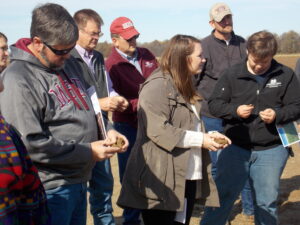
A total of 56 Extension agents, 20 NRCS personnel, 5 agency, 11 service providers and 12 farmers attended the 6 STARS workshops offered by the project directors. Pre- and post-workshop surveys of STARS participants showed gains in knowledge of the economic, social, and environmental values and benefits of integrating conservation of natural resources with plant and animal production systems to promote sustainability. Average gains from pre-workshop scores of 0.8 and 1.0 were recorded for questions related to familiarity with water and soil conservation and knowledge of conservation benefits, respectively, on Likert scales where 1 = "very little" understanding and 5 = "very much" understanding.
Increase awareness and knowledge by ANR extension personnel of best management practices, technologies for measuring and managing natural resources use, and the types and availability of support materials.
During the 6 STARS professional development workshops described previously, presentations and field demonstrations included content related to best management practices, technologies for measuring and managing natural resources use, and the types and availability of support materials. In addition to the project directors, instructors included professionals who could provide technical assistance to landowners in support of Extension agent efforts, including personnel from NRCS, Soil and Water Conservation Districts, Farm Services Administration, and private land biologists from state agencies and private non-governmental organizations.
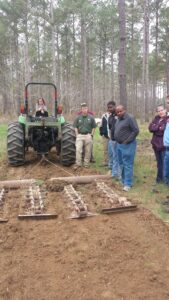
Pre- and post-workshop surveys were completed by STARS workshop participants to provide insight into their understanding of conservation practices. Surveys indicated agents were least familiar with water-related practices such as on-farm water storage, weirs and tailwater recovery; 46.2% (n=8), 68.8% (n=11) and 62.5% (n=10), respectively, reported they had "never heard the term", "heard the term but not the meaning" or "were unsure of the meaning". Greatest confidence was reported for more familiar conservation strategies such as prescribed fire, native warm season grasses and field buffers, in that 53.8% (n=13), 38% (n=11) and 35% (n=10) of agents, respectively, reported they were "confident they could accurately tell others" about these topics.
All agents reported improved knowledge of workshop topics after completion of the training, as assessed by the workshop-specific pre- and post-training surveys.
Increase knowledge in ANR extension and education personnel of existing federal- and state-level programs (including incentives, requirements, easements, and restoration support) and research-based educational materials which can assist producers in adopting and implementing sustainable agricultural practices.
During the 6 STARS professional development workshops conducted during the project period, material on federal and state programs which can assist producers in adopting and implementing sustainable agricultural practices was included. Personnel from NRCS, Soil and Water Conservation Districts, Farm Services Administration, university researchers, and private land biologists from state agencies and private non-governmental organizations were among the STARS workshop instructors. These instructors were intentionally selected to provide face-to-face opportunities for networking and information-sharing to promote understanding of program options and confidence to encourage sharing with Extension clients. Handouts downloaded from governmental websites were shared as example pieces and as future reference.
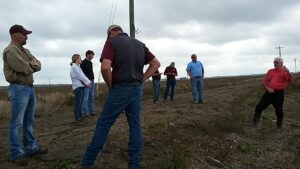
Pre-workshop assessments showed that all but 2 STARS participants were "familiar with" NRCS or "confident [they] could accurately tell others" about NRCS. When asked about their familiarity with specific NRCS programs, there was some uncertainty reported on workshop surveys. All STARS participants were familiar with CFR but some participants reported that they had "never heard the term", and "heard the term but not the meaning", or were "unsure of the meaning" of EQIP/incentives programs (10%, n=29), Farm Bill (10%, n=29), and RCPP/Conservation Planning (28%; n=8).
All STARS workshop participants showed an average 1.2-point increase (on a 5-point Likert scale) in reported knowledge level on post-workshop surveys.
Promote competency of ANR extension and education personnel in sustainable agriculture outreach.
Grant funds were used to support agent-led STARS-based educational events for private landowners. Project directors assisted agents with developing field day/workshop agendas, soliciting instructors, providing support materials, and managing workshop operations.
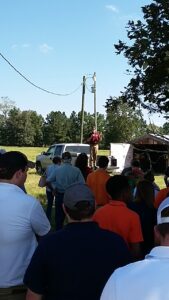
As a result of their training, 9 STARS-trained agents conducted 5 field day/workshops during the project period, including the following: Waynesboro, Sept. 26, 2017; Tchula, Nov. 3, 2017; Pontotoc, Nov. 7, 2107; West Point, Nov. 16, 2017; Ripley, Mar. 19, 2019. These workshops were attended by a total of 11 Extension personnel, 23 NRCS personnel, 5 agency staff, 11 service providers, 103 farmers/producers and 93 others participants (mostly high-school students from area schools).
Furthermore, a one-year, post-workshop phone survey was implements. A total of 21 agents answered questions about whether they shared content they learned at the STARS workshops. Only two of the agents reported not sharing anything with clients because they felt the material they learned did not have direct application to their local landowners' needs; the remainder did share workshop content with their clients. Most frequently shared topics included conservation practices such as CRP and EQIP (86%), water conservation (81%), wildlife habitat (81%) and nutrient management (71%). Workshop topics that were shared least often included weirs (10%), on-farm water storage (38%), tailwater recovery (38%) and field buffers (43%).
Promote adoption of best management practices and other strategies which optimize production and economic returns as well as natural resources conservation.
STARS-trained agents were encouraged to share information they learned during workshops with their clients.
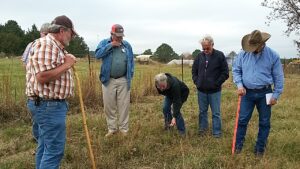
A one-year post-training phone survey was conducted, and 21 agents were surveyed about their knowledge of producer-adoption of conservation and sustainability practices addressed in STARS workshops. Agents reported the frequencies of farmer implementation for the following conservation practices: soil health/management (76%); conservation programs like EQIP and CRP (72%); nutrient management (67%); water conservation (67%); wildlife habitat (67%); grazing management (e.g., rotational grazing; 62%); forest management (52%); pollinator conservation (48%); riparian buffers (36%); field buffers (33%); on-farm water storage (33%); tailwater recovery (24%); and weirs (5%).
Educational & Outreach Activities
Participation summary:
Learning Outcomes
Project Outcomes
Preliminary analysis of pre-post surveys of agents’ knowledge of key concepts indicates workshop participation increased agent knowledge of sustainable agriculture and natural resources conservation topics and issues and increased their understanding of best management practices